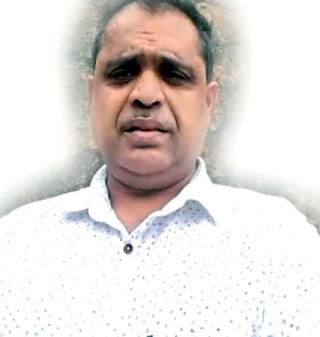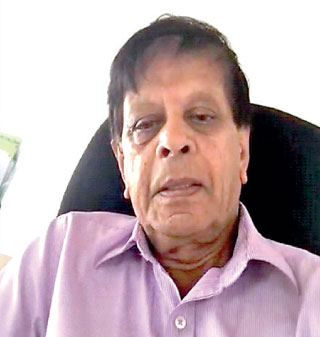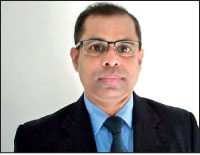Saturday Feb 21, 2026
Saturday Feb 21, 2026
Friday, 20 May 2022 01:17 - - {{hitsCtrl.values.hits}}

Prof. O.G. Dayaratna Banda

Chandrasena Maliyadde

Prof. Sirimal Abeyratne
 By M.N. Medonza
By M.N. Medonza
This article is based on a presentation made on 30 April 2022 at the monthly seminar of the Sri Lankan Economic Association (SLEA), via the ‘Zoom’ platform and is the third of the monthly seminar series of the year. Prof. O.G. Dayaratna Banda, Professor in Economics, Department of Economics and Statistics, University of Peradeniya made the presentation on “Work vs. Retire: The controversy on the retirement of researchers/academics in Sri Lanka” and the discussant was Chandrasena Maliyadde, retired eminent government official while the moderator of the seminar was Prof. Sirimal Abeyratne, Professor in Economics, University of Colombo.
Retirement has become a major life event particularly in the dawn of the 20th century. Today, perhaps many Sri Lankans on the cusp of retirement are caught between the devil and the deep blue sea. Considering its significance as a social institution and impact on macroeconomic imbalances “retirement’ should be addressed with much prominence.
Shrinking working age population
Demographic aging is a rather new phenomena in Asian countries and its onset in Sri Lanka, aging population is more rapid than history. Sri Lanka’s aged 60 and above population as a share of the total population is approximately 14% which is the highest in South Asia and the country will probably have the third oldest population in Asia in the near future. By 2030, Sri Lanka’s aged 60 and above population is expected to increase to 22% and by 2040 to 25% of the total population.
The population growth rate of the country has fallen from 1.414% in 1984 to 0.531% in 2020. This digit indicates the drop of new additions to the labour force. The economic consequences of it to the country is that the aged continue to consume resources even after they have given up being productive by leaving the labour force. The average life expectancy in Sri Lanka has risen from 68.17 years in 1980 to 77.22 years in 2021. Since, the size of the elderly population will increase significantly forming an aging of society and a rising age dependency ratio. In 1981 the dependency ratio was 11.4%, 1921 – 26.2% and 1931 it will be 32.8%. The female labour force participation rate remained low over the period of past decades. The female population as a share of the total population of Sri Lanka in 2021 was 52.1%. It is rising at an increasing annual rate.
The speed and trajectory of demographic transition in Sri Lanka have put downward pressure on aggregate labour supply as older workers retire. As the population ages, the costs of looking after the needs of the elderly increase and translate into increased fiscal costs for the government. The concerns are exacerbated by the country’s current economic downturn.
Retirement age of university academics
The statutory retirement age has been increased up to 65 years recently in Sri Lanka like some other countries. The retirement age for university academic staff is defined as 65 years in the University Act no 16 of 1978 and during 1978 the life expectancy of the country was 68 years.
There is a very small research population in Sri Lanka and of them university academics are about 4,100. This number has been further alarming due to migration of academics (brain-drain). Sri Lanka may be compelled to increase the retirement age of all intellectual workers to facilitate the knowledge based economy.
There are various opinions against extending the retirement age of academics; ageing supposedly results in a less productive person, high cost of pays for senior researchers/academics, constraint adding young researchers/academics afresh and it leads for non-existence of new research areas, fields or disciplines, non-flexibility of allocation funds for emerging research needs as older academics may be engaged in certain areas of research for so long, some academics/researchers might have reached their top saturation level of creativity and innovation, less interest and commitment, institutional inertia due to resistance of changing for novelty may also cause for unsustainable institutions, etc.
The international evidence on the retirement age of intellectual workers; in the US, tenured professors can voluntarily retire after 70, in the UK, professors can retire at the age of 65-70 from their permanent positions, in Norway this age is 70 and academics of Nigeria retire at their 70s.
The question that we should raise ourselves is, what benefits would be of allowing academics to serve longer? The patience and research capabilities gained over the period of time by academics are invaluable. The experience in academia means having accumulated more knowledge, connection, network, teaching practices, research skills, and one cannot gain within a shorter period of time. Understanding with the prevailing systems of R&D and ability to contribute for the betterment of that respective institution also should be valued. Their persistent interest in research, innovation, teaching, capabilities of mentoring students, supporting research programs, serving as a think tank, etc. are a few of various benefits.
Recommendations
Demographic, economic, and various other factors of Sri Lanka strongly indicate the need to reform the existing retirement model to prevent the working-age population from shrinking.
A new retirement model that encompasses a comprehensive social security system is strongly recommended. The current retirement model consists mainly of pension schemes and provident funds.
It needs to establish an adequate income support system through a pension system or a comprehensive social security system. Currently, individuals are forced to extend their working-age because of various insecurities created in income and long-term care.
The retirement of academics in Sri Lanka needs to be reconsidered in a new retirement model accompanied by institutional and regulatory reforms. The current retirement model for intellectual workers is simply the termination of employment rather than implementing a comprehensive retirement model.
There is a need to reconsider the retirement age of various categories of intellectual workers with the retirement policy being agile as a whole.